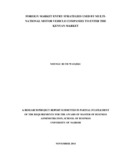| dc.description.abstract | Multinational corporations move to foreign countries for various reasons which include;
to get access to raw materials, to increase their sales turnover, to take advantage of the
reduced transport and distribution costs, avoidance of trade and non –tariff barriers, to get
more proximity to their customers and finally to increase their profits. MNCs too just like
the local companies face stiff and increasing competition from fellow multinational
companies and other domestic firms. They also face other challenges in their host
countries like cultural differences, language barriers, little brand awareness, political
instability, currency fluctuations and instability, local opposition and great set up costs.
Several research studies have been conducted on the market entry strategies. However,
none of the previous studies to the best knowledge of the researcher has dealt exclusively
on the entry strategies adopted by the Multinational motor vehicle companies to enter
Kenya. Hence there exists a knowledge gap that warrants this study. The purpose of this
study was to determine the market entry strategies used by the motor vehicle
multinational corporations to enter the Kenyan market. The study was conducted in form
of a descriptive survey. The population of interest for this study was the multinational
motor vehicle companies in Kenya. Kenya association of motor industry (KMI) has 24
registered multinational motor vehicle companies. Primary data was collected through the
use of semi structured questionnaires. Data collected was coded and entered into the
Statistical Package for Social Sciences for analysis (SPSS) which helped in organizing
and summarizing the data by the use of descriptive statistics. Frequency tables, bar
graphs and pie charts were used to present the data. The study found that the directors
participate in the decision making involving expansion strategies. The study deduced that
the factors made the company to choose the Kenyan market to a very great extent include
company’s strategic orientations/objectives and proximity to customers. The study
established that most of the company reviews their entry strategies after 3 years. Kenyan
motor vehicle market was also described as a strong competition. The study revealed that
the performance of the corporations since their entry in Kenya has improved. From the
findings, the study concludes that there are various factors influencing the choice of
foreign marketing strategy among motor vehicle companies such as company’s strategic
orientations/objectives, proximity to customers, availability of labor and country
economic environment. The study further concludes that the main strategies used by the
motor vehicle companies to enter the Kenyan include exporting, foreign direct
investment, franchises, licensing and strategic alliances. This study therefore
recommends that the institutions charged with the responsibility of licensing new firms to
regulate the entry of new firms so as to avoid unhealthy competition. Motor vehicle
companies should continuously improve on the quality of the products and also be
innovative to keep abreast with emerging technology and trends. The study also
recommends that motor vehicle companies should continue investing in various foreign
marketing strategies so as to meet the company objectives and mission | en_US |

